Judge's Order Criticizes DeKalb Prosecutors for Refusing to Participate in Murder Trial
Judge Shondeana C. Morris issued a scathing order calling out county prosecutors for what she said were their repeated failures to timely prepare for trial.
January 23, 2020 at 02:08 PM
8 minute read
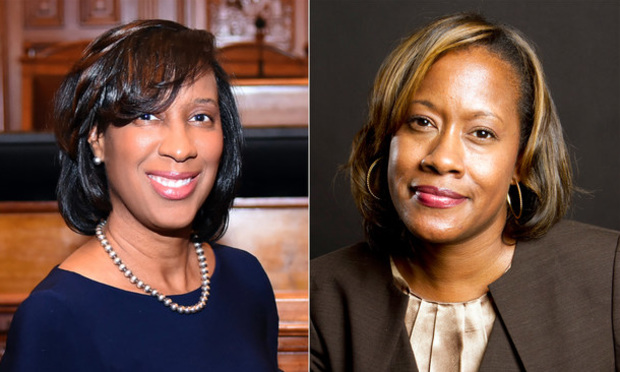 DeKalb Superior Court Judge Shondeana Morris (left) and district attorney Sherry Boston (Courtesy photos)
DeKalb Superior Court Judge Shondeana Morris (left) and district attorney Sherry Boston (Courtesy photos)
The DeKalb County district attorney's refusal to participate in a murder trial, even after a jury was seated, prompted the acquittal of two defendants in a scathing order handed down by the judge.
DeKalb Superior Court Judge Shondeana C. Morris, a former Fulton County prosecutor, said in a Jan. 10 order acquitting two defendants of murder and other felonies, that prosecutors gave her "no choice" but to grant an acquittal after they failed to secure necessary witnesses or timely obtain material witness warrants and delayed in obtaining orders to collect evidence to bolster their case. Prosecutors later refused to participate in jury selection, opening statements, or to call witnesses after Morris rejected their request to delay the trial.
Morris also criticized DeKalb County District Attorney Sherry Boston for balking at a defense offer to stipulate to the admission of any recorded interview of two key witnesses who evaded prosecutors' efforts to locate them.
"Instead, the state attempted to conceal its many failures by the belated filing of numerous motions unsupported by evidence or authority, which they knew to be without merit, or which were contrary to the law and rules," she said.
"The state takes the position that these defendants are dangerous to the community, but if so, it was the state which failed the community by failing to present any case at all for their conviction on the indicted charges," Morris added. "If there are consequences to the community for this acquittal, such consequences are attributable solely to the state."
The order infuriated Boston, who said it doesn't accurately reflect what happened.
"I feel like we have an order that stands as some level of gospel," she said. "It's just not the full story. This is no small matter. It's not about the state being ready. It's simply about why on earth did this happen in the way it happened."
Boston contended that other judges would have granted a continuance after prosecutors informed the judge they couldn't locate two key witnesses. Boston said her team asked the judge to dismiss the felony charges, although she acknowledged the proposed dismissals would have allowed her office to reinstate them.
"I have never seen anything like it in my 20 years of practicing law, both as a prosecutor and defense lawyer," Boston said of Morris' insistence the trial go forward. "But the unusual part in my mind is not that the state chose not to participate. The unusual circumstance is that you have a judge ordering a prosecutor to prosecute someone."
Boston acknowledged that jeopardy attaches after a jury is seated and that a directed verdict for acquittal is not appealable.
Yet, the district attorney said she intends to find a way to challenge the acquittal. "What I can tell you is … it's not over for this office," she said. "We are going to decide the best course of action that we need to take in order to hold these defendants accountable for murder in this case."
The defense bar applauded Morris' directed verdict acquitting Quintez Griffin and Stephen McAllister after prosecutors assured the judge last October that they were ready for trial.
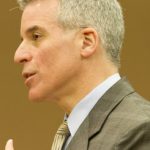 Brian Steel, the Steel law Firm, Atlanta. (Photo: John Disney/ALM)
Brian Steel, the Steel law Firm, Atlanta. (Photo: John Disney/ALM)Griffin's attorney, Brian Steel, said the judge's decision to move forward with the trial, which Morris specially set last October, stemmed from prosecutors' refusal to set bond for Griffin, despite evidence Steel said proved Griffin's innocence. Griffin was jailed without bond in December 2018.
Steel said Griffin's arrest rested on a photo identification by one of prosecutors' two witnesses, who was originally charged with the murder of Carthel "C.J." Johnson during what police said was a drug deal that became a robbery. After implicating Griffin and McAllister, Pierre Singletary left the state and has evaded a material witness warrant for his testimony.
Steel said Griffin's girlfriend provided an alibi, corroborated by location signals from Griffin's cellphone that placed him far from the crime scene. Griffin's cellphone records also showed he had no contact with the shooting victims or McAllister.
Steel said two forensic experts also challenged the reliability of a security video that prosecutors said placed Griffin at the crime scene. Steel said his experts determined the man caught on tape was 6 inches taller than his client.
Steel said that last September he presented the evidence to Senior Assistant DA Oto Ekpo and asked that Griffin be given a bond.
Steel presented his evidence to Morris at an Oct. 29 hearing after prosecutors failed to act on his request. Ekpo argued at the hearing that Griffin was a flight risk, a danger to the community and had been identified as an alleged perpetrator. She also argued that Steel's contention that Griffin was wrongly accused should be decided by a jury.
Morris decided not to give Griffin bond. But she agreed to Steel's request for an accelerated trial to begin Jan. 7. Ekpo said prosecutors would be ready, according to Steel and Morris' order.
But six weeks later, prosecutors asked the judge to postpone the trial until June, arguing that Ekpo, who is pregnant, would be medically unable to participate, and their witnesses were unavailable. In the meantime, Griffin should remain in jail, they said.
Morris turned them down.
On Dec. 9, prosecutors also made their first application for a search warrant to obtain DNA evidence from Griffin and McAllister, both of whom had been in custody for a year.
Then, a week before Christmas, prosecutors moved to recuse Morris from the case, arguing that, five years earlier, she prosecuted McAllister as an assistant Fulton County DA in an unrelated case.
Boston said that when prosecutors realized Morris once prosecuted McAllister, "We didn't have any reason to believe she was necessarily biased. Frankly, we think she doesn't remember." But the issue, Boston maintained, "wasn't about bias. … We felt it had the appearance of an inability to be impartial."
 Drew Findling, Atlanta. (Photo: John Disney/ALM)
Drew Findling, Atlanta. (Photo: John Disney/ALM)Drew Findling, McAllister's defense attorney, said he never saw any evidence of bias or lack of impartiality, and that the recusal motion was another attempt to continue the case.
"If we saw there was something that would raise a red flag for us in terms of impartiality, then we would have filed that motion ourselves," he said.
In December, prosecutors also requested material witness warrants for Singletary and another person who was shot during the same robbery.
Boston said that, when prosecutors agreed in October to a January trial, they did not know there would be an issue with their witnesses.
Prosecutors brought the warrants to the judge on Christmas Eve, just two weeks before the scheduled trial. Neither witness was in custody when the trial began on Jan. 7.
Prosecutors again asked for a continuance, then requested a nolle prosequi order dismissing the charges. Defense lawyers objected.
Boston said her team also asked Morris to dismiss the case for want of prosecution. Boston said she made the call not to participate going forward after Morris denied the motion.
She argued that, without prosecutors' participation at trial, the defendants were not in any jeopardy of being convicted and thus could be tried later for the same offenses.
In her order, Morris said she granted the directed verdict of acquittal because, "A defendant charged with a crime enters upon the trial with presumption of innocence, which remains with him throughout unless and until the state presents sufficient evidence to overcome such presumption. As the state refused to participate in the trial of these defendants in any manner … the state could not and did not overcome this presumption."
Boston acknowledged that not participating in the trial "was extraordinary because we saw the judge taking an extraordinary step" not to continue or dismiss the case without a judgment of acquittal.
But Steel contended that the evidence he secured was sufficient to win a jury acquittal.
"This was a total abuse of the power of the prosecutors," he said. "If they really wanted a trial, I was standing there willing to stipulate to anything they needed to make this trial go forward."
Additional Reading
Questions for the Bench: Judge Shondeana Crews Morris of DeKalb County Superior Court
This content has been archived. It is available through our partners, LexisNexis® and Bloomberg Law.
To view this content, please continue to their sites.
Not a Lexis Subscriber?
Subscribe Now
Not a Bloomberg Law Subscriber?
Subscribe Now
NOT FOR REPRINT
© 2025 ALM Global, LLC, All Rights Reserved. Request academic re-use from www.copyright.com. All other uses, submit a request to [email protected]. For more information visit Asset & Logo Licensing.
You Might Like
View All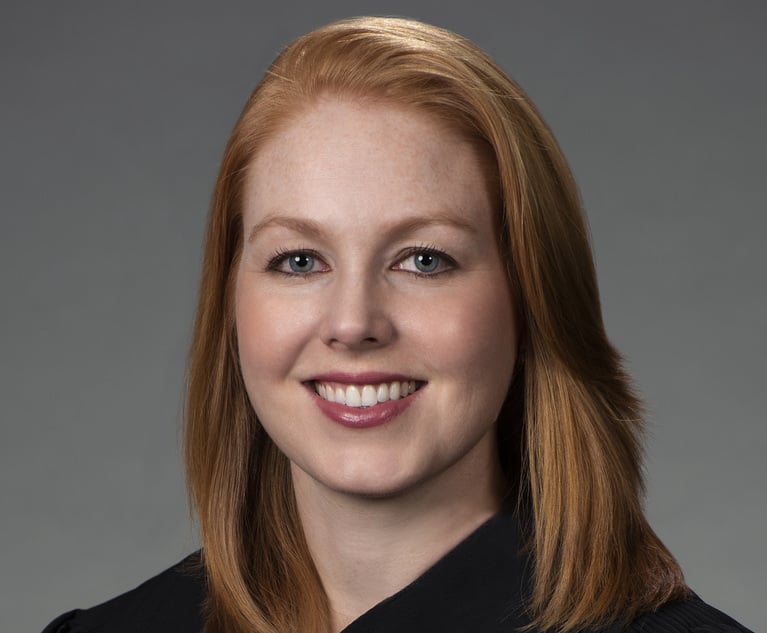
Justice Known for Asking 'Tough Questions' Resolves to Improve Civility
4 minute read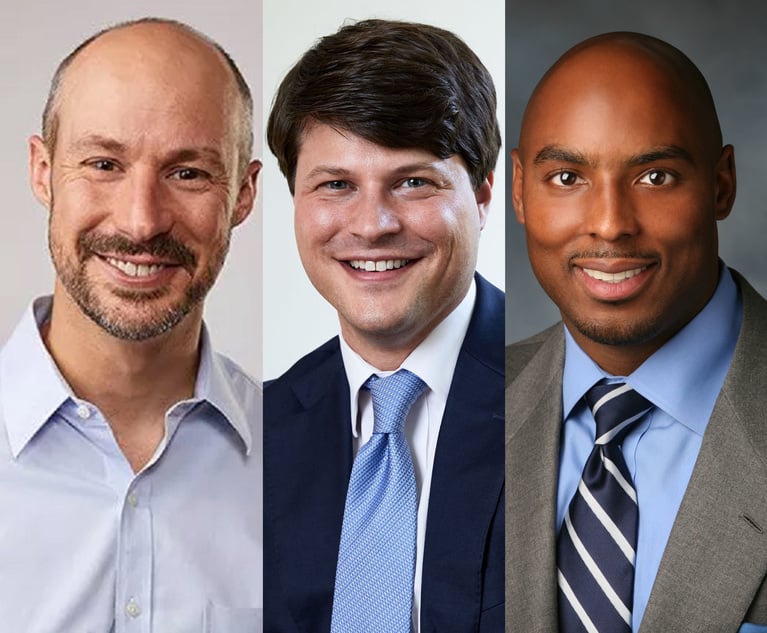

Alston & Bird Adds M&A, Private Equity Team From McDermott in New York
4 minute read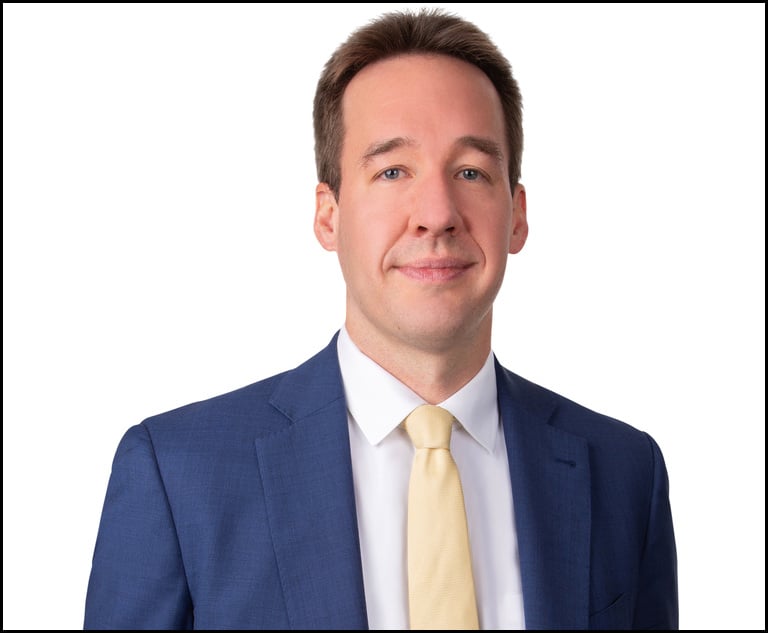
Veteran Federal Trade Law Enforcer Joins King & Spalding in Washington
4 minute readTrending Stories
- 1Balch & Bingham Elects New Partners, Adds Litigator From Jones Walker
- 2People in the News—Jan. 16, 2025—McGuireWoods, High Swartz
- 3'Pushed Into Oncoming Traffic': $5.85M Settlement in Mediated Auto Tort
- 4The Marble Palace Blog: Supreme Court Books You Should Read in 2025
- 5Avoiding Legal Risks: Crafting a Strong Do Not Call Policy for Compliance
Who Got The Work
J. Brugh Lower of Gibbons has entered an appearance for industrial equipment supplier Devco Corporation in a pending trademark infringement lawsuit. The suit, accusing the defendant of selling knock-off Graco products, was filed Dec. 18 in New Jersey District Court by Rivkin Radler on behalf of Graco Inc. and Graco Minnesota. The case, assigned to U.S. District Judge Zahid N. Quraishi, is 3:24-cv-11294, Graco Inc. et al v. Devco Corporation.
Who Got The Work
Rebecca Maller-Stein and Kent A. Yalowitz of Arnold & Porter Kaye Scholer have entered their appearances for Hanaco Venture Capital and its executives, Lior Prosor and David Frankel, in a pending securities lawsuit. The action, filed on Dec. 24 in New York Southern District Court by Zell, Aron & Co. on behalf of Goldeneye Advisors, accuses the defendants of negligently and fraudulently managing the plaintiff's $1 million investment. The case, assigned to U.S. District Judge Vernon S. Broderick, is 1:24-cv-09918, Goldeneye Advisors, LLC v. Hanaco Venture Capital, Ltd. et al.
Who Got The Work
Attorneys from A&O Shearman has stepped in as defense counsel for Toronto-Dominion Bank and other defendants in a pending securities class action. The suit, filed Dec. 11 in New York Southern District Court by Bleichmar Fonti & Auld, accuses the defendants of concealing the bank's 'pervasive' deficiencies in regards to its compliance with the Bank Secrecy Act and the quality of its anti-money laundering controls. The case, assigned to U.S. District Judge Arun Subramanian, is 1:24-cv-09445, Gonzalez v. The Toronto-Dominion Bank et al.
Who Got The Work
Crown Castle International, a Pennsylvania company providing shared communications infrastructure, has turned to Luke D. Wolf of Gordon Rees Scully Mansukhani to fend off a pending breach-of-contract lawsuit. The court action, filed Nov. 25 in Michigan Eastern District Court by Hooper Hathaway PC on behalf of The Town Residences LLC, accuses Crown Castle of failing to transfer approximately $30,000 in utility payments from T-Mobile in breach of a roof-top lease and assignment agreement. The case, assigned to U.S. District Judge Susan K. Declercq, is 2:24-cv-13131, The Town Residences LLC v. T-Mobile US, Inc. et al.
Who Got The Work
Wilfred P. Coronato and Daniel M. Schwartz of McCarter & English have stepped in as defense counsel to Electrolux Home Products Inc. in a pending product liability lawsuit. The court action, filed Nov. 26 in New York Eastern District Court by Poulos Lopiccolo PC and Nagel Rice LLP on behalf of David Stern, alleges that the defendant's refrigerators’ drawers and shelving repeatedly break and fall apart within months after purchase. The case, assigned to U.S. District Judge Joan M. Azrack, is 2:24-cv-08204, Stern v. Electrolux Home Products, Inc.
Featured Firms
Law Offices of Gary Martin Hays & Associates, P.C.
(470) 294-1674
Law Offices of Mark E. Salomone
(857) 444-6468
Smith & Hassler
(713) 739-1250






